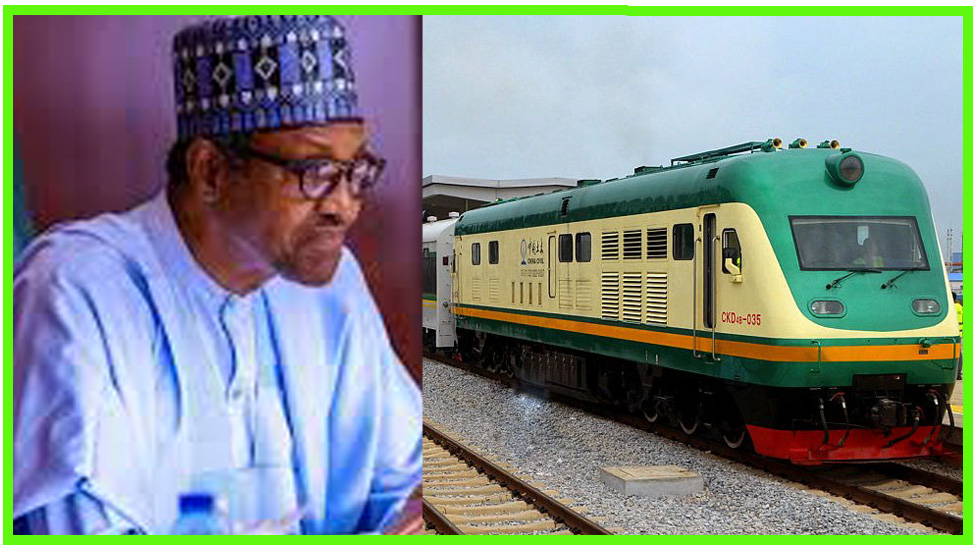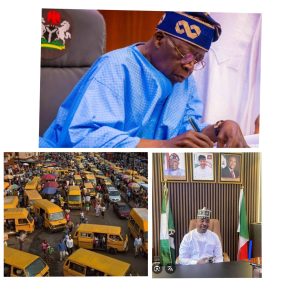
INFRASTRUCTURE
-Presidential approval, in 2020, for the establishment of InfraCoPlc, a world class infrastructure development vehicle, wholly focused on Nigeria, with combined debt and equity take-off capital of N15 trillion, and managed by an independent infrastructure fund manager.
– Establishment in 2020 of the Presidential Infrastructure Development Fund (PIDF), with more than $1 Billion in funding so far.
– The Nigerian Sovereign Investment Authority (NSIA) has seen total additional inflows from the Government of around US$2 billion under the Buhari Administration – since the original US$1 billion which the Fund kicked off with in 2012.
– Launch of the Nigeria Innovation Fund, by the NSIA, to address investment opportunities in the domestic technology sector: data networking, datacenters, software, Agri-tech, Bio-tech, etc.
RAIL
– 156km Lagos-Ibadan Standard Gauge Rail nearing completion
– 327km Itakpe-Warri Standard Gauge Rail completed and commissioned 33 years after construction began.
– Abuja Light Rail completed in 2018.
– Ground-breaking done for construction of Kano-Maradi Standard Gauge Rail, and revamp of Port-Harcourt-Maiduguri Narrow Gauge Rail.
– Financing negotiations ongoing for Ibadan-Kano Standard Gauge Rail project
ROADS
– Presidential Infrastructure Development Fund (PIDF), investing over a billion dollars in three flagship projects: Lagos-Ibadan Expressway, Second Niger Bridge, Abuja-Kaduna-Zaria-Kano Expressway.
– Executive Order 7 mobilizing private investment into the development of key roads and bridges like Bodo-Bonny in Rivers and Apapa-Oshodi-Oworonshoki-Ojota in Lagos
– Highway Development and Management Initiative (HDMI), a public-private partnership program to mobilise, in its first Phase, over a Trillion Naira in private investment into the development and maintenance of 12 Roads, amounting to 1,963km in length.
– More than 360 billion Naira worth of Sukuk Bonds raised since 2017 for dozens of critical road projects across all six geopolitical zones.
PORTS
– Completion of New Terminals for International Airports in Lagos, Abuja, Kano and Port Harcourt
– Construction of New Runway for Abuja and Enugu International Airports
– Presidential approval for four International Airports as Special Economic Zones: Lagos, Kano, Abuja and Port Harcourt.
– Approval for new private-sector funded deep sea ports: Lekki Deep Sea Port (Construction already well underway, for completion in 2022); Bonny Deep Sea Port (Ground-breaking done in March 2021); Ibom Deep Sea Port; and Warri Deep Sea Port
– Development of capacity at the Eastern Ports:
o In December 2017, Calabar Port commenced export of bulk cement to Tema Port in Ghana
o In 2019, three container ships berthed at Calabar Port, for the first time in eleven years
o Dredging of Warri Port (Escravos Bar—Warri Port channel) completed in 2018
o On October 30, 2019, an LPG Tanker operated by NLNG, berthed in Port Harcourt – the first time ever an LPG ship berthed in any of the Eastern Ports
o On December 8, 2019, Onne Port received JPO VOLANS (owned by Maersk), the FIRST gearless and largest container vessel (265.07 metres) to call at any Eastern Port in Nigeria.
o On August 1, 2019, Onne Port’s Brawal Terminal received MSC GRACE, its first container vessel since 2012.
POWER
Energizing Education Programme: Taking clean and reliable energy (Solar and Gas) to Federal Universities and Teaching Hospitals across the country. Four Universities completed and commissioned already: BUK (Kano), FUNAI (Ebonyi), ATBU (Bauchi) and FUPRE (Delta); others ongoing.
Energizing Economies Programme: Taking clean and reliable energy (Solar and Gas) to markets across the country. Completed projects include Sabon-Gari Market in Kano, Ariaria Market in Aba, and Sura Shopping Complex in Lagos.
National Mass Metering Programme: Nationwide rollout of electricity meters to all on-grid consumers, launched in August 2020. The Central Bank of Nigeria is providing 60 billion Naira for the first phase, with a target of 1 million meter installations. So far more than 500,000 meters have been delivered to the Discos, and more than 280,000 installed.
Solar Power Naija: Launched in April 2021 to deliver 5 million off-grid solar connections to Nigerian households. The program is expected to generate an additional N7 billion increase in tax revenues per annum and $10 million in annual import substitution. In May 2021, the Rural Electrification Agency announced the planned deployment of solar-powered grids to 200 Primary Health Centres (PHC) and 104 Unity Schools nationwide.
Presidential Power Initiative (PPI), aka Siemens Power Program: A Government-to-Government initiative involving the Governments of Nigeria and Germany, and Siemens AG of Germany, to upgrade and modernize Nigeria’s electricity grid. Contract for the pre-engineering phase of the Presidential Power Initiative (PPI) was signed in February 2021, following the 2020 approval for the payment of FGN’s counterpart funding for that phase.
Nigeria Electrification Project (NEP) has provided grants for the deployment of 200,000 Solar Home Systems, impacting one million Nigerians. The NEP is also delivering mini-grids across the country.
HOUSING
– The Family Homes Fund Limited (FHFL), incorporated by the Federal Government of Nigeria in September 2016, is the implementing agency for the Buhari Administration’s National Social Housing scheme.
– More than two thousand (2,000) hectares of land with titled documents have been given by 24 States for the Buhari administration’s Social Housing programme, with the capacity to accommodate about 65,000 new homes.
– Under the National Social Housing programme, Nigerians will be given at least a 15-year period with a monthly payment at 6 percent interest rate, to pay for each housing unit. The Central Bank of Nigeria is providing a N200 Billion financing facility, with a guarantee by the FGN.
OIL AND GAS
The Buhari Administration has declared this decade the “Decade of Gas.”
– Ground-breaking on 614km Ajaokuta-Kaduna-Kano Gas Project.
– Successful completion of Nigeria’s first Marginal Field Bid Round in almost 20 years, expected to raise in excess of half a billion dollars, and open up a new vista of investment in oil and gas.
– Launch of National LPG Expansion Programme (including Removal of VAT from the domestic pricing of LPG)
– Financial close and signing of contract for NLNG Train 7, which will grow Nigeria’s production capacity by about 35%
– Nigeria and Morocco have in 2021 signed an agreement to develop a US$1.4 billion multipurpose industrial platform (Ammonia and Di-Ammonium Phosphate production plants) that will utilize Nigerian gas and Moroccan phosphate to produce 750,000 tons of ammonia and 1 million tons of phosphate fertilizers annually by 2025. It will be located in Ikot-Abasi, Akwa-Ibom State.
– Commissioning, in December 2020, of the new NPDC Integrated Gas Handling Facility in Edo State, the largest onshore LPG plant in the country, with a processing capacity of 100 million standard cubic feet of gas daily, producing 330 tonnes of LPG, 345 tonnes of propane and 2,600 barrels of condensate, daily.
– Establishment of a $350m Nigerian Content Intervention Fund, to finance manufacturing, contracts and assets in the oil and gas industry
– Financial Close on the following NNPC-involved projects:
o A 10,000 tonnes per day methanol plant and a 500 million standard cubic feet per day gas processing plant, in Odeama, Brass, Bayelsa State.
o The ANOH gas processing plant, with a processing capacity of 300 million standard cubic feet of gas, in Imo State. It is a Joint Venture between SeplatPetroleum Development Company and the Nigerian Gas Company, a wholly owned subsidiary of Nigerian National Petroleum Corporation (NNPC). It also has the potential to deliver 1,200MW of power when completed.
o Comprehensive Rehabilitation of the Port Harcourt Refinery (PHRC). Sign-off Ceremony of Engineering, Procurement & Construction (EPC) Contract held in April 2021, marking the commencement of site handover and full mobilization to site.
– Policy, Regulatory and Funding Support for the establishment of Modular Refineries across the Niger Delta. When the Administration took office in 2015 Nigeria had only one functioning Modular Refinery. Today there are at least six ongoing brownfield and greenfield Modular Refinery Projects across the Niger Delta. In 2020 President Buhari commissioned the first phase of the Waltersmith Modular Refinery, in Imo State.
– Launch of the Nigerian Upstream Cost Optimization Programme (NUCOP), to reduce operating expenses through process enhancement and industry collaboration.
AGRICULTURE
– Anchor Borrowers Program (ABP): The Anchor Borrowers Programme (ABP) of the Central Bank of Nigeria, launched by President Muhammadu Buhari on November 17, 2015, has made more than 300 billion Naira to more than 3.1 million smallholder farmers of 21 different commodities (including Rice, Wheat, Maize, Cotton, Cassava, Poultry, Soy Beans, Groundnut, Fish), cultivating over 3.8 million hectares of farmland.
– Presidential Fertilizer Initiative: Launched as a government-to-government partnership between the Nigerian and Moroccan Governments, in December 2016, the Presidential Fertilizer Initiative (PFI) produced ~12million 50kg bags of NPK 20:10:10 equivalent in 2020, bringing total production since inception to over 30 million 50kg bags equivalent; and number of participating blending plants increased to 44 from three at inception.
– Special-Agro Industrial Processing Zones (SAPZ) Programme: A partnership between FGN, AfDB Group, and other stakeholders including IFAD and BOI. Under the SAPZ programme, agro-processing centres will be established across the country. The agro-processing centres will be provided with basic infrastructure such as water, electricity and roads as well as facilities for skills training. Seven (7) States and the FCT selected for the pilot phase, due to commence 2021: Ogun, Oyo, Imo, Cross River, Kano, Kaduna, Kwara.
– The Green Imperative – a Nigeria-Brazil Agricultural Mechanisation Programme aimed at boosting agricultural production in Nigeria. The National Assembly has approved a loan for the financing of the program, which will involve the development of 632 privately-operated primary production (mechanisation) Service Centers and 142 Agro processing (value addition) service Centres across the 774 LGAs, and the reactivation of 6 privately owned partially-operational or moribund tractor assembly plants nationwide. It will also train 100,000 new extension workers.
SOCIAL INVESTMENT AND POVERTY ALLEVIATION
– In 2016, President Buhari launched the National Social Investment Programme, currently the largest such programme in Africa and one of the largest in the world. Currently, the National Social Register of poor and vulnerable Nigerians (NSR) has 32.6 million persons from more than 7 million poor and vulnerable households, identified across 708 local government areas, 8,723 wards and 86,610 communities across the 36 States of the country and the FCT.
– From this number, 1.6 million poor and vulnerable households (comprising more than 8 million individuals, in 45,744 communities from 5,483 Wards of 557 LGAs in 35 states and the FCT are currently benefiting from the Conditional Cash Transfer (CCT) program, which pays a bimonthly stipend of N10,000 per household.
– In January 2019, President Buhari launched Nigeria’s Micro-Pension Scheme – which allows self-employed persons and persons working in organisations with less than 3 employees to save for the provision of pension at retirement or incapacitation.
– Establishment of Survival Fund, National Youth Investment Fund, and National Special Public Works Program (774,000 beneficiaries across 774 LGAs nationwide), and the Central Bank’s Covid-19 300 billion Naira Targeted Credit Facility (TCF) – more than 150 billion Naira disbursed so far – to support millions of small businesses, households and young people, with federal grants, loans and stipends.
– The Buhari Administration’s Survival Fund has provided its grants (Payroll Support, Artisan and Transport Sector grants, and General MSME grants) to more than 800,000 beneficiaries, since the last quarter of 2020. It has also provided free business registration to more than 200,000 MSMEs across the country.
– Presidential approval for the establishment of the Nigeria Investment and Growth Fund (NIG-Fund), in 2021.
– As at the end of 2020, Development Bank of Nigeria (which commenced operations in 2017) had disbursed 324 billion Naira in loans to more than 136,000 MSMEs, through 40 Participating Financial Institutions (PFIs). (57% of the beneficiaries are women-owned MSMEs while 27% are youth-owned).
– Bank of Industry has disbursed more than 900 billion Naira in loans to over 3 million large, medium, small and micro enterprises, since 2015.
– In January 2019, President Buhari launched Nigeria’s Micro Pension Scheme – which allows self-employed persons and persons working in organisations with less than 3 employees to save for the provision of pension at retirement or incapacitation.



